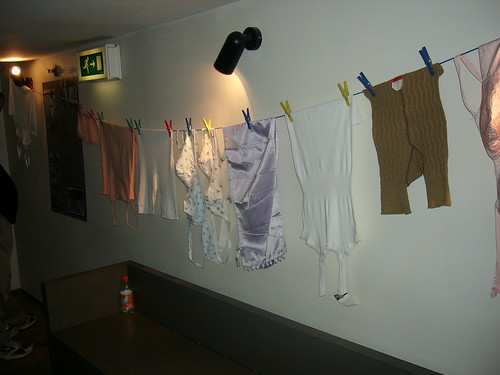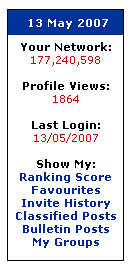A t-shirt I saw today best describes the three Baltic countries I have just spent two weeks in: “I love Lithuania…but where’s that?”
Lithuania, like Latvia and Estonia, are countries everyone seems to have heard about, but know absolutely nothing about them. Synonymous with communism with my parents generation, and Eurovision with my generation, the Baltic three actually have a rich history and give the traveller a diverse experience, whether it be in beautiful countryside, evidence of Soviet brutality, or good ‘ol stag parties (cheap alcohol, beautiful women, bargain flights from England = a perfect weekend away with the boys).
I spent three days in Tallinn, the capital of Estonia, and two in its cultural capital Tartu. I spent five days in Riga, capital of Latvia. And I spent three days in Vilnius, capital of Lithuania, which included a small day-trip to Trakai.
Tallinn I didn’t like because it was a superficial tourist town. Tartu I didn’t see because I spent most of time indoors with my hosts (met a girl in Paris, and she and her friends took care of me – hard to sightsee in the rain). Riga I don’t remember – something to do with four dollar Vodka bottles (dollars as in Aussie Pesos, more like three USD). And Vilnius is quiet and quirky – I’ve been very entertained.

The reconstructed castle at Trakai – Built more in mind to make money from tourists, than to actually reconstruct it how it was. The Lithuanians had a joint empire with the Polish that stretched from the Baltic to the Black seas. The castle is built on a island, with several other islands bridging it to the main land
Tallinn plays up its medieval history, which I found a little tacky. Nevertheless it is a pleasant city, and to give it credit, I never ventured outside of the Old Town (the suburbs, like honestly!). Tartu on the other hand is a university town, and as such has that special dynamic found in any university town: hot chicks. Ho ho. Actually what I mean is a vibrant feel about it. But the chicks were hot as well. Not that I could notice because I was freezing my buttocks off. However I did notice the new construction works, like a huge shopping mall that replaced a beautiful market apparently, and which my friends hate – big ugly, capitalistic buildings.
Riga, like much of Latvia itself, is a beautiful city. Unfortunately, the hostel I stayed out was a crazy party place. It literally killed me. Vilnius is hilarious – for example, my hostel is located in the ‘breakaway republic’ of Uzupis, across the river from the centre of the city. The republic comprises of drunks, artists, and squatters. There is a statue of Frank Zappa (the only one in the world apparently), and a few communist statues that the locals left because they thought they looked pretty (everything else got pulled down – not as pretty I suppose). At the same time, it was chilling, as I visited the Museum of Genocide victims – the former KGB local headquarters and torture chambers today – I am still shaking from the experience.

Gas chamber at the KGB Headquarters in Vilnius. Under the glass panels there were items from people that perished here.
Estonians are closely related to the Finns, and more distantly, the Sami (indigenous Laplanders) and Hungarians. Latvians look like and are considered Nordics, evidenced through the strong historical, cultural and religious influences gained over centuries during Germanic and Scandinavian colonisation and settlement.
The Lithuanian ethnos – a Baltic tribe originally – has been influenced by Slavic and Germanic peoples in the past. Genetically Lithuanians are one of tallest peoples in the world (I didn’t notice). One eighth of Lithuanians are immune to HIV which is also one of the highest percentages of immunity in the world (according to wikipedia.org) – whilst Estonia has the highest proportions of people infected with HIV.
Latvians and Lithuanians belong to the Indo-European branch of languages. One thing I found absolutely fascinating, was testing out a theory my grandfather has, which is that the
Lithuanians are linguistically the most similar to the Greek language. Whilst four plus thousand years has created a completely different looking ethnicity for both nations, as well as variation in language from the tribes they both apparently originated from – I could still see a lot of similarities between the language, which was startling as Lithuanian and Greek – despite both Indo-European languages – are completely different sub-categories.

Never leave a drunk German in the same room as me
Some words I found from the Chinese restaurant, and whilst walking in the streets (English – Lithuanian – Greek)…this is incomplete, would appreciate corrections.
Chinese – Kiniskos – Kinezos
Noodle – makaronu – makaronia
salad – salotos – salata
squid – kalmari – kalamari
pepper – paprikomis – paprika
cucumbers – agurkai – agouryia
fried – kepta – kafta
pineapple – ananasais – anana
rice – ryziai – ryzee
And the following signs I saw, I am guessing because of the similarity to Greek.
stomatologijos – in Greek, stoma means mouth, and logos is -ologist. Not sure if there is a Greek equivilant, and what it is in english. Mouth doctor?
Dentist – odontologijos – odontodeatros
Orthodontist – ortodontas – greek?
Photographer – fotografijos – fotografos
chocolate – sokoladu – sokolata
Update 19 December 2005: As shown by a commentator below, I am wrong. And chatting with my father, as to my grqandfathers theory, I apparently misinterpreted him: my gradfather believed the similarity existed due to the grammatical structure of the language, not actual words. Whoops.

By the river in Riga
There is intense pride in all the people of the Baltic’s that they have independence, as they have a relatively large land mass but a rather small population (Estonia – 1,332,893, Latvia – 2,290,237 , Lithuania – 3,596,617. Source: US Government). The intense pride is because the Baltic three, used to have the Baltic Blues, as there were constantly dominated. With a long history of occupation by their stronger neighbours, they declared independence in 1918, fought independence wars against Germans and Russia’s, and were recognised as independent countries in 1920. Twenty years later, they “elected” to be part of the Soviet Union, something they are still extremely pissed off about.
Estonians, Latvians, and Lithuanians were deported en-masse to Siberia, and the lands were populated with Russians, as part of Stalin’s attempt to eradicate nationalities. The affect in this post-cold war period – is a lot of Russians in the local community, where they are not just sizable minorities, but in the case of Latvia – a majority in all the cities.

What it looked like on the other side of the Iron Curtain
Now, having just come from Russia, I don’t think this is a bad thing: I like Russians. But apparently, the Russians of the Baltic’s are different from the real Russians. They are the Hispanics of America, the Albanians of Greece and Macedonia, the Moroccans of Western Europe, and the ?¢‚Ǩ?ìAsian?¢‚Ǩ‚Ñ¢s?¢‚Ǩ? of the UK. In other words, the poor, criminal segment of the population. Well, perceived in that way anyway. This problem was exemplified by my bus trip into Estonia.
My bus from St Petersburg to Tallinn, had me sit next to a friendly girl. Anastasia was a 22 year old university student, who was returning home from a semester in St Peterburg. Her English, though not perfect, was decent. Although she calls Estonia home, she can’t speak Estonian beyond a few basic phrases – her English is better than her Estonian. And her parents don’t speak any Estonian. Ethnically she is Russian, and yet despite living outside of Russia, she and her family make not efforts to integrate into the country they live in. They live in Russian neighbourhoods, she went to Russian schools, and parties at Russian clubs. Why bother learning the local language?

Exhibition at a Tallinn historical museum, just before the Soviet stuff, and just after the medieval traders exhibition. This was the history of women’s undergarments. I left a message in the guestbook demanding equality: where are the men?¢‚Ǩ‚Ñ¢s?
On one of my nights out in Riga, I struck a conversation with a promotions girl trying to get me to buy Finlandia Vodka, but ended up trying to get me to join her at a Latin/Cuban dancing concert the next day. I asked Anna if she was Russian. “Noooo! I am not Russian” in a accent that could only make you smile (or maybe it was the costume they made me smile). Anna, as she told me, does not like the Russians. Anna, also, does not understand why I like Russians. To her, a Russian is an old, arrogant babushka who refuses to integrate into her beautiful country. To me, a Russian is a two metre tall dark-haired but light-eyed supermodel, with more university degrees then I can count.
At another bar, this time in Tallinn, I asked the waitress if she was Estonian or Russian – even though she looked as Scandinavian as they get. She didn’t like that question – I never got that glass of water. Whilst the guy at the Riga tourist office was more informative, not so much with what he said but with the look of disgust on his face: “They Russians. They just cause us trouble”, whilst looking outside at the protest some old Russian’s were making outside of the Town Hall. Apparently, in Latvia 45 percent is Russian speaking (although 29 per cent is ethnically Russian, according to the dude in the office).

Those damn Russians: protesting at the privitisation of a gas company. This is the image peoples seem to have of the Russian community in the Baltics (the others being thugs on the street, and prostitutes)
With a history of occupation, you would think that now they have their independence, they will resist any pressure to give it up. So said those drunk fellows we met at a pub in Tallinn, who played the tough guy routine, but whom I later sobered up with an arm wrestle (popping someone?¢‚Ǩ‚Ñ¢s ego is one of life’s great pleasures). They don’t like the European Union, because it threatens their sovereignty.
Laura, my friend in Tartu, sees it differently. Slightly more intelligent, and sober, she said that as much as they don’t like it, they have to. It is for their own protection, because their country is simply too small, with extremely large neighbours threatening their existence. I must say, I agree.
Economically, the countries seem to be booming, thanks largely to their recent EU accession. In fact, whilst Western Europe fears Estonian cheap labour for example, it appears that the Estonian economy actually has a skills shortage with the very things the Westerner’s fear will flood their markets: plumbers, electricians, and other basic skills. With a booming economy, also comes booming prices, however wages don’t seem to be moving in line. In 1995, Latvia’s minimum wage was 28 Lats (40 Euros) per month – with the government now deciding to move the current 80 Lats (113 Euros) a month to 90 Lats (128 Euros), which makes Latvia the lowest in the EU. In the mean time, the average wage is about 120 Euros a month (on a 39 hour week). But remember to not let statistics fool you, because ‘average’ means half of all people earn less than that – one of the girls at the hostel in Riga told me, that an average wage is about one Lat an hour (1.4 Euros). I took that to mean, that’s what a smart 20 year old student like her makes.
Latvia has the lowest wages, although I didn’t necessarily find it to be the cheaper country. Lithuania’s average wage is 145 Euros a month, and Estonia’s 158 Euros. In comparison, the UK average wage is 1,160 Euros a month.
Update 23 November 2005: A commentor has brought to my attention that these figures are inaccurate. The source of the figures above is from an article by Sue Birze titled “Another Day, Another Lat”, for the The Baltic Guide (in English about Latvia) September 2005. The article’s figures were sourced from “EIRO, 2004”. Looking into the numbers, they don’t make sense. For example, the article talks about minimum wages and yet the table of wages states ‘average monthly’ wages, when the figures in fact correlate with minimum wages. A little researching into the source confirms that the reporter put the wrong heading on the table. The Estonian Government (PDF)states that the average wage, for example, is actually 8,845 Kroon (565 Euro) for June 2005. These figures give a better overview for wages and the labour force. I am not even going to provide new figures, because of the exponential growth that these countries are experiencing, will mean that the figures will already be out-of-date by the time they are released to the public.

A cultural museum in Tartu. Never trust an Estonian to build your house. Never.
Whilst people whine and moan about the EU becoming too powerful and empire-like, the EU is doing something else in the former Eastern Bloc. With NATO and EU flags proudly flying in the sky, the Baltic three are reorganising their laws, society and infrastructure under the guidance of the EU. The result is that it is giving a new generation of people – my generation and hopefully older- the opportunities their parents were not allowed to have. Freedom.

Looking out of a KGB’s guard post, in the HQ in Vilnius. The torture rooms left me shaking.
 gets from sleazy older men. Right now, I am writing this blog entry because a reader asked if I could write more about the interaction between psychology and successful web start-ups. His comment validated my opinions, spurring me to write more on the subject.
gets from sleazy older men. Right now, I am writing this blog entry because a reader asked if I could write more about the interaction between psychology and successful web start-ups. His comment validated my opinions, spurring me to write more on the subject.








